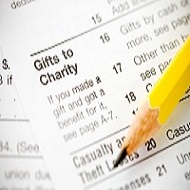The Supreme Court in Americans for Prosperity v. Bonita struck down a California law that required nonprofits registered in the state to solicit charitable donations to disclose major donors to the California Attorney General. Specifically, the California law required organizations to file Schedule B to their Form 990 with their annual state registration filing, which contains the names and addresses of major donors. The law imposed penalties and possible suspension of an organization’s registration for failure to do so. The state contended that the information contained on Schedule B was necessary to police misconduct by charities. The Supreme Court found that disclosure of donor names would result in a chilling effect on donations to controversial nonprofit organizations that impermissibly burdens donor free speech and impermissibly burdens the right to freely associate under the exacting scrutiny standard of review.
Background. Beginning in 2010, the conservative Americans for Prosperity Foundation and Thomas More Law Center refused to comply with the new California disclosure law and filed redacted versions of their Schedule Bs to remove donor identifying information. The charities alleged that disclosure would subject donors to possible reprisals if the information were to be made public, as had happened in the past where it was discovered that the Attorney General’s office had publicly posted nearly 1,800 forms online. The organizations argued that donors faced threats and potential harassment when their donations were not kept confidential and this made donors less likely to donate to their organizations. The resulting “chilling effect” brought about by the California law they contend violates a donor’s right to freely associate and freedom of speech.
The State of California argued that information was needed for regulatory oversight and to investigate fraud, self-dealing, and abuse of an organization’s tax exempt status. Further, the State had an important interest in the efficiency and effectiveness of gathering this information upfront. Ultimately, the case turned on the findings of fact that the Attorney General’s investigators did not rely on Schedule Bs to detect charitable fraud in practice and the finding that the Attorney General’s office could not ensure that the information would remain confidential. Chief Justice Roberts writing for the majority states:
California casts a dragnet for sensitive donor information from tens of thousands of charities each year, even though that information will become relevant in only a small number of cases.
Thus, the law was not narrowly tailored to the State’s important government interest in policing charity misconduct and, under exacting scrutiny, the burden of the law on donors’ right to freely associate and freedom of speech was not justified. Therefore, the law was found to be unconstitutional on its face.
Implications. Legal commentators maintain it is unclear whether similar laws, like the one in New York, will remain in place under the ruling and whether there could be an effect on federal and state laws that require public disclosure of campaign contributors, which could sharply increase the flow of dark money supporting candidates and advocacy efforts. According to University of Chicago law professor David Strauss, the impact of this decision is difficult to predict because historically “the Court has tried to draw a line between disclosures that are really going to hurt people… and disclosures that are unlikely to be harmful. The question is whether, after this decision, the Court is still going to try to draw that line, or is instead going to say: disclosure laws of all kinds risk chilling speech.” One thing is clear however, the job of those tasked with oversight to prevent tax-exempt charities from being used for partisan purposes has been made more difficult.
Click here for more information on the decision.
Click here to read the opinion in its entirety.


